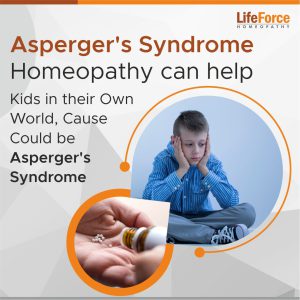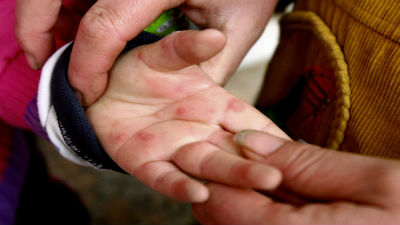 Asperger’s syndrome is a developmental disorder characterized by severe impairments in reciprocal social interaction, the use of language for social discourse, and a circumscribed interest in unusual subjects. A difference in cognitive and social-emotional skills creates difficulty for an individual to understand their world and how to interact with it.
Asperger’s syndrome is a developmental disorder characterized by severe impairments in reciprocal social interaction, the use of language for social discourse, and a circumscribed interest in unusual subjects. A difference in cognitive and social-emotional skills creates difficulty for an individual to understand their world and how to interact with it.
Individuals with Asperger’s syndrome can exhibit a variety of characteristics and the disorder can range from mild to severe, they often have obsessive routines and may be preoccupied with a particular subject of interest. People with Asperger’s syndrome tend to be “in their own world”. The onset of Asperger’s syndrome commonly occurs after the age of 3. While language development seems, on the surface, normal, individuals with Asperger’s syndrome often have deficits in pragmatics and prosody. Vocabularies may be extraordinarily rich, “however persons with Aspergers can be extremely literal and have difficulty in using language in a social context.
Although symptoms of Asperger’s can be similar to autism disorder, but it is actually a different condition. The major difference between the two disorders is that people with Asperger’s syndrome develop and can use language skills, while people with autism disorder have severe delays in developing language skills as a child. Asperger’s syndrome is characterized by poor social interactions, obsessions, odd speech patterns, few facial expressions, and other peculiar mannerisms. Often, kids with Aspergers Syndrome have trouble reading the body language of others. They might engage in obsessive routines and show an unusual sensitivity to sensory stimuli — for example, they may be bothered by a light that no one else notices; they may cover their ears to block out sounds in the environment; or they might prefer to wear clothing made only of a certain material.
Overall, kids and teens with Asperger’s Syndrome can function in everyday life but tend to be somewhat socially immature, relate better to adults than peers, and may be seen by others as odd or eccentric.
Causes of Asperger’s syndrome:
- Neurobehavioral disorder – neurological dysfunction in the way the brain processes information.
- Genetics – high incidence of inheritance particularly with fathers and other first and second-degree relatives.
- Medial frontal and temporal lobe dysfunction
- Difficulty with pre, peri and postnatal conditions that might have caused minimal brain damage
- Can also occur with disabilities such as cerebral palsy, attention deficit disorder etc.
Symptoms of Asperger’s syndrome:
- Children with Asperger’s will present many factors about their subject of interest, but there will seem to be no point of confusion.
- They often do not recognize that the other person has lost interest in the topic
- Areas of interest may be quite narrow, such as an obsession with train schedules, phone books, or a collection of objects
- Repeats words
- Single-mindedness
- Cannot start an appropriate conversation or keep going
- Social withdrawal
- Avoid eye contact
- Clumsiness
- Does not like changes in daily routine
- Do not express pleasure at other people’s happiness
- Does not understand other people’s facial expressions
- Has a problem making friends
- Repetitive finger flapping, twisting, or whole-body movements
- Have difficulty in showing, bringing, or pointing out objects of interest to other people
- Lack of empathy
- May be bothered by loud noises, Lights, or strong tastes or textures
- They do not recognize the need to change the volume of their voice in different settings
- Delays in being able to ride a bicycle, catch a ball
Read about Autism and how you can treat it with Homeopathy.
Diagnosis of Asperger:
Can be diagnosed by testing child’s learning style, speech and language, IQ, social and motor skills, and according to characteristic symptoms.
Treatment of Aspergers syndrome:
Speech and language therapy, cognitive behavioral therapy, physical and occupational therapy, and social skills training will be helpful.
Asperger’s syndrome may result in ADHD (attention deficit disorder) affecting cognition or autism affecting speech in the long run. It is important to address this issue at an early stage with specific homeopathic treatment for ADHD. Neglecting treatment for ADHD can turn into autism in complicated cases. It is advisable to start homeopathy for autism and ADHD to prevent other developmental disorders with Asperger’s syndrome.
HOMEOPATHIC MANAGEMENT FOR ASPERGER’S SYNDROME:
Homeopathy is one of the most popular holistic systems of medicine. The selection of remedy is based upon the theory of individualization and symptom similarity by using a holistic approach. This is the only way through which a state of complete health can be regained by removing all the signs and symptoms from which the patient is suffering. The aim of homeopathy is not only to treat Aspergers but to address its underlying cause and individual susceptibility. As far as therapeutic medication is concerned, several well-proved medicines are available for Asperger’s syndrome treatment that can be selected on the basis of cause, sensation, and modalities of the complaints. For individualized remedy selection and treatment, the patient should consult a qualified homeopathic doctor in person. Some important remedies are given below for Asperger’s treatment:
Chamomilla, Ignatia, Pulsatilla, Iodum, Hepar Sulph, Anacardium, Lycopodium, Causticum, Sanicula, Argentum Nit, Sulphur, Silicea, Bryonia, Antim Crude, and many other medicines.
Are you or someone dear to you facing these problems?
Check out the link: https://www.askdrshah.com/ for details of how such patients can be helped with Homoeopathy – Treatment without Any Side effects.
For more details, you may contact us at 022-266888888.
Got Questions? Get answers to all the questions regarding your ailment from Dr. Shah directly.





atorvastatin 20mg drug lipitor 20mg uk atorvastatin 40mg sale
order ciprofloxacin 1000mg sale – buy baycip tablets augmentin 375mg generic
cheap cipro 1000mg – keflex ca augmentin 375mg over the counter
ciplox price – buy erythromycin paypal purchase erythromycin pill
flagyl 200mg generic – purchase zithromax buy generic zithromax for sale
ivermectin tablets – sumycin cost sumycin 500mg canada
purchase valacyclovir – order mebendazole 100mg pills order acyclovir 400mg generic
ampicillin online buy purchase ampicillin online cheap where to buy amoxicillin without a prescription
flagyl pills – buy amoxil generic buy zithromax 500mg generic
oral furosemide 100mg – tacrolimus 5mg cost purchase capoten
order metformin 1000mg without prescription – baycip order online order generic lincocin
purchase retrovir without prescription – order avapro 300mg generic how to get zyloprim without a prescription
clozaril 50mg without prescription – accupril where to buy oral famotidine 20mg
buy anafranil 25mg pill – sinequan online purchase doxepin generic
buy quetiapine 100mg online cheap – buy eskalith without a prescription order eskalith
atarax pills – buy lexapro paypal how to buy endep
order augmentin 625mg pill – order myambutol 600mg generic purchase baycip online cheap
buy generic amoxicillin over the counter – buy generic axetil online buy ciprofloxacin generic
zithromax 500mg brand – buy tetracycline online order ciplox generic
order cleocin pill – cefixime cost chloramphenicol order online
buy ivermectin 2mg – doxycycline brand cefaclor 250mg cheap
albuterol tablet – buy albuterol pill theo-24 Cr
purchase medrol pill – methylprednisolone 16 mg otc astelin canada
glyburide 2.5mg drug – glipizide us order forxiga 10mg
metformin 1000mg usa – order precose sale cheap precose
prandin 2mg sale – cost jardiance 10mg order jardiance 10mg sale
buy semaglutide without prescription – order desmopressin order desmopressin spray
buy lamisil 250mg pills – terbinafine 250mg canada griseofulvin generic
buy nizoral 200 mg without prescription – buy itraconazole paypal buy itraconazole generic
famvir 250mg canada – buy famvir generic buy valcivir generic
purchase digoxin generic – order labetalol 100 mg sale furosemide canada
order metoprolol 100mg generic – metoprolol 50mg us adalat cost
microzide oral – order zebeta online buy generic zebeta online